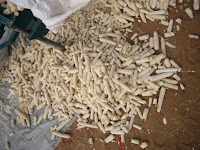Our factory is in full swing, the seeds are being shelled, threshed, winnowed, cleaned and graded ready for packing.
 |
| Shelling groundnuts |
 |
| Winnowing groundnuts |
 |
| Grading, cleaning and dressing maize seed |
 |
| Threshing pigeon peas |
 |
| Ox cart loaded with groundnut shells used for cattle fodder |
Coffee
Our neighbours in the South of the country grow coffee, which they are harvesting at present. The succulent red flesh is removed from the green beans which are subsequently fermented, washed, dried, exported and roasted to taste.
 |
| Red coffee berries ready to pick |
 |
| Green beans from inside the flesh |
Mount Mulanje
At 3000 metres, shrouded in mist and legend, Mount Mulanje, (southern Malawi), is the highest mountain in Central Africa. The mountain, a granite intrusion, is a landmark for agile tourists who, with the assistance of porters hike and climb. In mid July the porters race 25km up the mountain on rocky terrain, many in bare feet and the girls in skirts as Malawian women don't wear shorts or trousers. Following the race there is great entertainment in the form of music and dance throughout the day.
 |
| The winning porter |
Visitors
Terri's brother and his wife spent almost 3 weeks sharing our life on the Lakeshore. They, along with the remainder of our a family, have funded the repair of the local school roof.
Roger and Hannah are mathematicians and computer scientists and shared their knowledge with 200 learners at the local secondary school.
 |
| Roger and Hannah conducting a robot workshop at Lisumbwe Secondary School, Monkey Bay. | | | | | | | | | | | | | | | | |
|
|
|
Fixing the roof
 |
| Work in progress |
 |
| Almost complete |
|
|
|
|
|
|
 |
| Locally trained carpenters working on the roof beams |
During our remaining time in Malawi we will see the growing season through and explore the northern plateau, following the trail of the C19th missionaries including David Livingstone!
T and I





















































